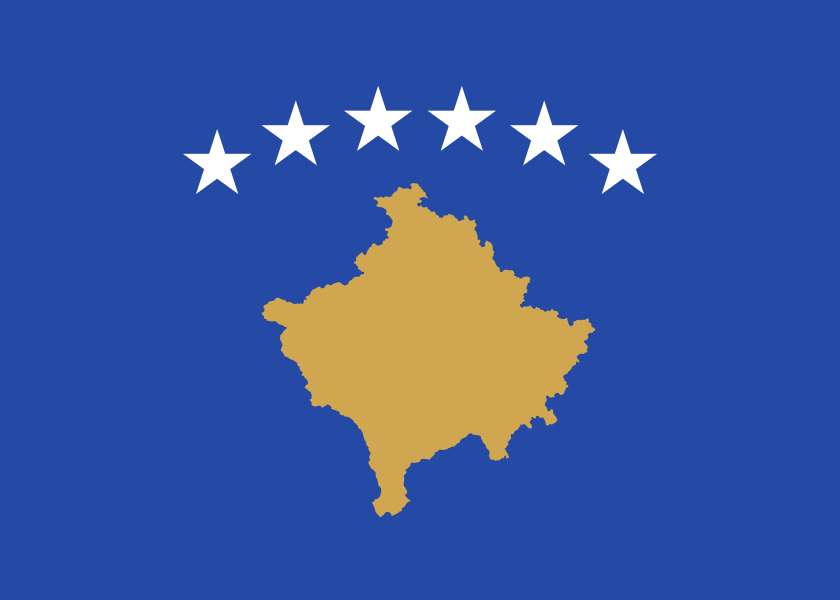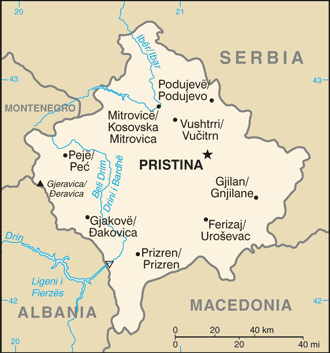Kosovo Protests
In this article, we shall examine what led to the 2015 and then the more recent January 2016 Kosovo protests. We will discuss the factors that have led to the protests in Pristina through the past year, as well as the police and government reaction to what transpired in the country. As we shall see, much of the conflict between Kosovar protesters and the government stems from a long history related to Serbia, and the international relations between Kosovo and Serbia.
History of Kosovo and Serbia
In order to understand the domestic unrest in Kosovo that took place in 2015 and 2016, it is necessary to know about the history of Kosovo and Serbia. Kosovo is a country located in southeastern Europe. The issue of whether Kosovo belongs to Serbia or the ethnic Albanians (which make up the vast majority of the population of Kosovo (at 1.8 million persons) is one that has been debated and disagreed upon for centuries. Serbia lost Kosovo to the Ottoman Empire in the late 1300s (1389). Serbia took Kosovo over in 1912, and continued to control Kosovo, despite Albanian demands to be either independent, or to be included within Albania.
Throughout the decades, this tension continued in Kosovo. There were multiple reports of the Yugoslavian government, under the regime of Slobodon Milosevic, carrying out various human rights abuses in Kosovo. In 1998, after decades of abuse, Albanian rebel groups began a rebellion against the government. This in turn led to a government crackdown, and an ethnic cleansing in the region. In 1998, the United States and NATO began a bombing campaign against the Serbia government. However, after the conflict ended, Kosovo was kept as a part of Serbia. Then, in 2008, Kosovar leaders declared independence from Serbia, upsetting Serbia, but receiving support by many Western countries such as the United States, the United Kingdom, etc…
Since that point, the two countries have not had good relations, since Serbia has not recognized Kosovo as an independent countries. However, by doing this, it is believed that Serbia’s chances into the European Union have been minimized. It is for this reason that there has been a push in the country by some leaders to work with Kosovo, as it would help their prospects for the EU.
2013 Brussels Agreement
In 2013, through the European Union as the negotiators, Kosovo and Serbia both committed to the Brussels Agreement, which improved relations between the two states. Here were the points of the Brussels Agreement:
1. There will be an Association/Community of Serb majority municipalities in Kosovo. Membership will be open to any other municipality provided the members are in agreement.
2. The Community/Association will be created by statute. Its dissolution shall only take place by a decision of the participating municipalities. Legal guarantees will be provided by applicable law and constitutional law (including the 2/3 majority rule).
3. The structures of the Association/Community will be established on the same basis as the existing statute of the Association of Kosovo municipalities e.g. President, vice President, Assembly, Council.
4. In accordance with the competences given by the European Charter of Local Self Government and Kosovo law the participating municipalities shall be entitled to cooperate in exercising their powers through the Community/Association collectively. The Association/Community will have full overview of the areas of economic development, education, health, urban and rural planning.
5. The Association/Community will exercise other additional competences as may be delegated by the central authorities.
6. The Community/Association shall have a representative role to the central authorities and will have a seat in the communities’ consultative council for this purpose. In the pursuit of this role a monitoring function is envisaged.
7. There shall be one police force in Kosovo called the Kosovo Police. All police in northern Kosovo shall be integrated in the Kosovo Police framework. Salaries will be only from the KP.
8. Members of other Serbian security structures will be offered a place in equivalent Kosovo structures.
9. There shall be a Police Regional Commander for the four northern Serb majority municipalities (Northern Mitrovica, Zvecan, Zubin Potok and Leposavic). The Commander of this region shall be a Kosovo Serb nominated by the Ministry of Interior from a list provided by the four mayors on behalf of the Community/Association. The composition of the KP in the north will reflect the ethnic composition of the population of the four municipalities. (There will be another Regional Commander for the municipalities of Mitrovica South, Skenderaj and Vushtrri). The regional commander of the four northern municipalities will cooperate with other regional commanders.
10. The judicial authorities will be integrated and operate within the Kosovo legal framework. The Appellate Court in Pristina will establish a panel composed of a majority of K/S judges to deal with all Kosovo Serb majority municipalities.
11. A division of this Appellate Court, composed both by administrative staff and judges will sit permanently in northern Mitrovica (Mitrovica District Court). Each panel of the above division will be composed by a majority of K/S judges. Appropriate judges will sit dependant on the nature of the case involved.
12. Municipal elections shall be organized in the northern municipalities in 2013 with the facilitation of the OSCE in accordance with Kosovo law and international standards.
13. Discussions on Energy and Telecoms will be intensified by the two sides and completed by June 15.
14. It is agreed that neither side will block, or encourage others to block, the other side’s progress in their respective EU path.
15. An implementation committee will be established by the two sides, with the facilitation of the EU (RFERL, 2013).
2015 Protests in Kosovo
August 2015 Kosovo-Serbia Agreements
There were many protests that took place in Kosovo throughout the 2015 year. Some protests took place prior to the summer of 2015, but the Kosovo protests increased following the deal that Kosovo and Serbia made with one another in late August. These agreements, called “landmark agreements” by Federica Mogherini (who was the prime mediator during these talks) (BBC, 2015), set up a number of terms between Kosovo and Serbia as it relates to ethnic minorities in Kosovo.
For Serbia, continuing to work with Kosovo is essential if they are to ever get into the European Union (BBC, 2015). For example, after these agreements, Serbian Prime Minister Aleksandar Vucic was quoted as saying “This is a big achievement for the whole of Serbia and it means there are no longer any obstacles, nothing stands on Serbia’s way towards Europe” (BBC, 2015).
For Kosovo’s ruling party, they felt that these talks further establish Kosovo’s independence, even in the eyes of Serbia, who again, has not recognized Kosovo’s independence in 2008. Although there is no formal recognition, past (and then the 2015) agreements continued to make it so that Serbia was–in action–dealing with Kosovo as if it was its own independent state.
This agreement helped ease tensions on issues such as the Mitrovica Bridge, which both sides previously disagreed regarding its use. Furthermore, Kosovo would be given its own calling code, another important development for a country. However, some of the Kosovo protests, upset at the level of connection that the Serbian minorities have with Serbia, were upset with aspects of the agreement that maintained that connection. For example, “Serbian-majority areas in the north will still be able to use Serbian calling codes” (BBC, 2015).
However, some, such as the Kosovo government wrote on what they believe is Serbia’s lack of full commitment to all of the points of the Brussels Agreement.
Protests
Along with citizen protests during the year in Kosovo, there have also been challenges to running a functioning government in Kosovo. The reason for this is because of opposition parties to Thaci who have “…have paralysed the functioning of parliament in Pristina since mid-September, disrupting sessions by releasing tear gas, in a bid to get the agreements with Serbia overturned” (Yahoo, 2016). There are divisions in Kosovo about how how what level of autonomy (if any) Kosovar Albanians believe that ethnic Serbian minorities should be given by the government in Pristina.
In November 2015, Pristina police attempted to arrest Kosovar opposition leader Alban Kurti. The reason for their attempt to arrest him was due to Kurti holding protests inside parliament against the government because of their political deals with Serbia. Along with going after Kurti, the government also
2016 Kosovo Protests
On January 9th, 2016, protesters in Kosovo took to the streets in the capital of Pristina to speak out against what they feel are problematic international relations agreements that the Kosovar government has made with regards to areas in northern parts of the country.
Those protesting were mad because of what they viewed as bad concessions that the government in Pristina gave to the European Union and to Serbia as it pertains to the areas with high Serbian minorities in Mitrovica and other northern Kosovo areas. Among those active in the protests was Fatmir Limaj, who is the head of the Initiative for Kosovo party. Limaj was quoted as saying: “”We will not be governed by those who trade our sovereignty. We are seeking free elections to be organised immediately, because they no longer have the right to govern Kosovo” (Yahoo, 2016).
While many of the protesters were not violent, violence did break out during these protests. It was reported that windows were smashed, molotov cocktails were thrown, and part of government building was also set on fire (Yahoo, 2016) (the video above shows this).
References
BBC (2015). Kosovo and Serbia Sign ‘Landmark’ Agreements. BBC, 26 August 2015. Available Online: http://www.bbc.com/news/world-europe-34059497
Radio Free Europe/Radio Liberty (2013). Text of Leaked Copy of Serbia-Kosovo Recognition Deal. April 20th, 2013. Radio Free Europe/Radio Liberty. Available Online: http://www.rferl.org/content/text-leaked-copy-serbia-kosovo-agreement-brussels/24963542.html
Yahoo (2016). Large anti-government protest in Kosovo turns violent. January 9th, 2016. Available Online: https://www.yahoo.com/news/large-anti-government-protest-kosovo-turns-violent-165254810.html




